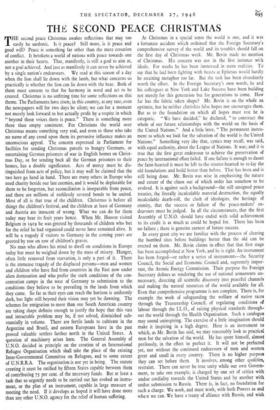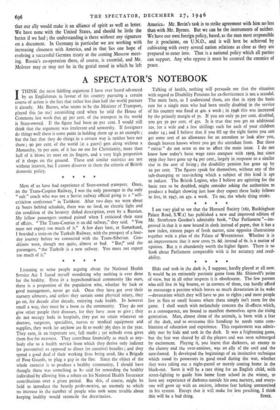THE SECOND PEACE CHRISTMAS
THE second peace Christmas awakes reflections that may too easily be sardonic. Is it peace? Still more, is it peace and good will? Peace is something far other than the mere cessation of conflict. It betokens a world of nations with peace towards one another in their hearts. That, manifestly, is still a goal to aim at, not a goal achieved. And just as manifestly it can never be achieved by a single nation's endeavours. We read at this season of a day when the lion shall lie down with the lamb, but what concerns us practically is whether the lion can lie down with the bear. Both of them must consent to that for harmony in word and act to be created. Christmas is no unfitting time for some reflections on this theme. The Parliaments have risen; in this country, at any rate, even the newspapers will for two days be silent; we can for a moment not merely look forward to but actually profit by a respite in which " beyond these voices there is peace." There is something more there than empty sentiment. For Christians the world over Christmas means something very real, and even to those who take no name of any creed upon them its pervasive influence makes an unconscious appeal. The concern expressed in Parliament for facilities for sending Christmas parcels to hungry Germans, or entertaining German prisoners of war in English homes on Christ- mas Day, or for sending back all the German prisoners to their homes, has a double significance. Acts of mercy must be dis- tinguished from acts of policy, but it may well be claimed that the two here go hand in hand. There are many others in Europe who need charity beside our late enemies, and it would be deplorable for them to be forgotten, but reconciliation is inseparable from peace, and there are millions of ruthlessly severed bonds to be united. Most of all is that true of the children. Christmas is before all things the children's festival, and the children at least of Germany and Austria are innocent of wrong. What we can do for them today may bear its fruit years hence. When Mr. Hoover visited Belgium in 1919 he was greeted by thousands of children who but for the relief he had organised could never have remained alive. It will be a tragedy if visitors to Germany in the coming years are greeted by row on row of children's graves.
No man who allows his mind to dwell on conditions in Europe today but must be weighed down by the mass of misery. Hunger, often little removed from starvation, is only a part of it. There is the immense tragedy of the displaced persons—men and women and children who have fled from countries in the East now under alien domination and who prefer the stark conditions of the con- centration camps in the west of Germany to submission to the conditions they believe to be prevailing in the lands from which they came. So far as their eyes can reach the horizon is uniformly dark, but light still beyond their vision may yet be dawning. The schemes for emigration to more than one South American country are taking shape definite enough to justify the hope that this vast and intractable problem may be, if not solved, diminished sub- stantially in volume. There are fertile lands to cultivate in the Argentine and Brazil, and eastern Europeans have in the past proved valuable settlers farther north in the United States. A question of machinery arises here. The General Assembly of U.N.O. decided in principle on the creation of an International Refugee Organisation which shall take the place of the existing Inter-Governmental Committee on Refugees, and to some extent of U.N.R.R.A. The organisation is not yet in being. The statute creating it must be ratified by fifteen States capable betwden them of contributing 75 per cent. of the necessary funds. But at least a task that so urgently needs to be carried out has evoked an instru- ment, or the plan of an instrument, capable in large measure of meeting the need. If it develops as hoped it will have done more than any other U.N.O. agency for the relief of human suffering. At Christmas in a special sense the world is one, and it was a fortunate accident which ordained that the Foreign Secretary's comprehensive survey of the world and its troubles should fall on the first day of Christmas week. Mr. Bevin made no mention of Christmas. His concern was not in the first instance with ideals. For weeks he has been immersed in stern realities. Ta say that he had been fighting with beasts at Ephesus would hardly be straining metaphor too far. But the task has been abundantly worth the effort. In the Foreign Secretary's own words, he and his colleagues at New York and Lake Success have been building not merely for this generation but for generations to come. How far has the fabric taken shape? Mr. Sevin is on the whole an optimist, but he neither cherishes false hopes nor encourages them. But as to the foundation on which all hopes must rest he is categoric. " We have decided," he declared, " to construct the whole of our future relationships with the world on the basis of the United Nations." And a little later, " The permanent instru- ment to which we look for the salvation of the world is the United Nations." Something very Tike that, cynics may recall, was said, with equal authority, about the League of Nations. It was; and it is true that the first great endeavour to achieve the preservation of peace by international effort failed. If one failure is enough to daunt the faint-hearted it must be left to the stouter-hearted to re-lay the old foundations and build better than before. That has been and is still being done. Mr. Bevin was wise in emphasising the nature and extent of the chaos out of which order has somehow to be evolved. It is against such a background—the still unsigned peace treaties, the literally incalculable material destruction, the equally incalculable death-roll, the clash of ideologies, the heritage of enmity, that the success or failure of the peace-makers' en- deavours must be judged. In all the circumstances, that the first Assembly of U.N.O. should have ended with solid achievement to its credit is as much as could be hoped for. There has been no failure ; there is genuine earnest of future success.
In every great city we are familiar with the process of clearing the borrtlied sites before buildings better than the old can be erected on them. Mr. Bevin claims in effect that that first stage has been accomplished at New York, and he is right. An instrument has been forged—or rather a series of instruments—the Security Council, the Social and Economic Council and, supremely impor- tant, the Atomic Energy Commission. Their purpose the Foreign Secretary defines as rendering the use of national armaments un- necessary, directing all scientific discovery into peaceful channels and making the natural resources of the world available for all. Even that comprehensive programme is not complete. There is, for example the work of safeguarding the welfare of native races through the Trusteeeship Council, of regulating conditions of labour through the I.L.O., of raising physical standards through.. out the world through the Health Organisation. Such a catalogue may sound uninspiring. The exercise of a little imagination should make it inspiring in a high degree. Here is an instrument to which, as Mr. Bevin has said, we may reasonably look as practical men for the salvation of the world. He has spent himself, almost perilously, in the effort to perfect it. It will not be perfected yet, nor without the continued endeavours of men and women great and small in every country. There is no higher purpose they can set before them. It involves, among other qualities, restraint. There can never be true unity while our own Govern- ment, to take one example, is charged by one set of critics with undue cordiality towards the United States and by another with undue submission to Russia. There is, in fact, no foundation for such a charge. We work, and must work, with both Powers as and whore we can. We have a treaty of alliance with Russia, and wish that our ally would make it an alliance of spirit as well as letter. We have none with the United States, and should be little the better if we had ; the understanding is there without any signature on a document. In Germany in particular we are working with increasing closeness with America, and in that lies one hope of evolving a successful German treaty at the coming Moscow meet- ing. Russia's co-operation there, of course, is essential, and Mr. Molotov may or may not be in the genial mood in which he left America r Mr. Bevin's task is to strike agreement with him no less than with Mr. Byrnes. But we can be the instruments of neither. We have our own foreign policy, based, as the man most responsible for it proclaims, on U.N.O., and it will best be achieved by cultivating with every several nation relations as close as they are prepared to enter into. That is a national policy which all parties can support. Any who oppose it must be counted the enemies- of peace.































 Previous page
Previous page